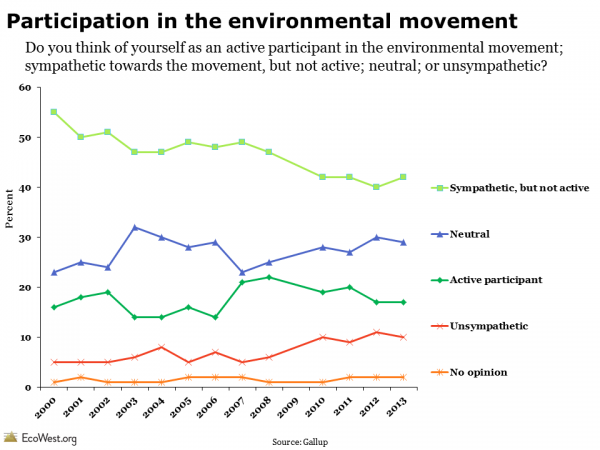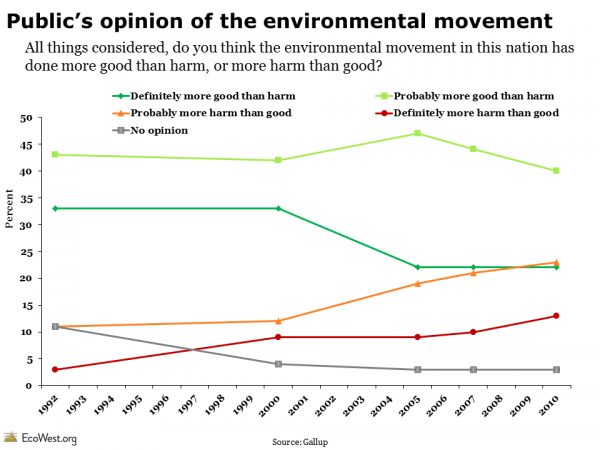Gallup has been polling Americans on the environment for decades and it’s one of the best sources I’ve found for tracking long-term trends in public opinion on conservation issues.
Something that struck me while analyzing this data is an apparent increase in hostility toward the environmental movement over the past decade or so.
The graphic below from our politics deck shows trends in participation in the environmental movement from 2000 to 2013 (Gallup apparently skipped the question in 2009).
Most Americans say they’re concerned about environmental issues, but fewer than one in five consider themselves active participants in the movement. Since 2008, that figure has fallen from 22 percent to 17 percent.
About two-fifths of Americans consider themselves sympathetic to the movement but not active, but the percentage of people saying they were “unsympathetic” has doubled since the early 2000s, from about 5 percent to 10 percent.
If you add the active participants (17 percent) and sympathizers (42 percent), you reach 59 percent, a healthy majority of Americans, but that’s down from 71 percent in 2000. Similarly, if you add the unsympathetic and neutral view points, it sums to 39 percent today, up from 28 percent in 2000.
Another survey question, which Gallup last asked in 2010, also suggests there is some rising animosity toward environmentalists.
The percentage of Americans saying the movement has definitely or probably done more harm than good rose from 14 percent in 1992 to 36 percent in 2010. Conversely, the fraction of Americans who said the movement had definitely or probably done more good than harm decreased from 76 percent in 1992 to 62 percent in 2010.
I don’t want to make too much out of these survey findings. The jump in unsympathetic Americans from 5 to 10 percent over 13 years isn’t exactly a groundswell of opposition to the environmental movement. But if I were a leader of an environmental NGO, this public opinion data would be troubling.
Why is there increasing negativity toward environmentalists? Other polling results we’ve examined show that support for environmental protections ebbed a bit during the Great Recession, so it would seem to follow that impressions of the movement would also take a hit during tough economic times.
In recent years, conservative politicians, opinion leaders, and interest groups have launched a barrage of attacks and negative advertising against environmentalists, so that may be a factor as well.
What do you think? Are there other reasons why more Americans view the environmental movement in a negative light?
Downloads
- Download Slides: Gallup Environmental Movement Poll (4200 downloads )
- Download Notes: Gallup Environmental Movement Poll (4065 downloads )
- Download Data: Gallup Environmental Movement Poll (4192 downloads )
Data sources
Results from Gallup’s environmental polling are summarized on this page and contained in our politics deck, which also has data from other environmental polls.
EcoWest’s mission is to analyze, visualize, and share data on environmental trends in the North American West. Please subscribe to our RSS feed, opt-in for email updates, follow us on Twitter, or like us on Facebook.




I work in a very liberal area and yet find that environmental support is often veneer-thin. I’ve spoken with people who identified as environmentally conscious until some of their own actions were curtailed. The restrictions might be significant, like not being able to expand their homes towards a creek, or trivial, like not burning wood on certain days or not being able to buy an incandescent light bulb. But these restrictions on their personal freedoms make them more receptive to conservative arguments about government intrusion.
Interesting point, Eric. Some of the other polling data we’ve analyzed shows that support for environmental protections drops when it’s posed as a tradeoff against economic growth, energy exploration, etc.